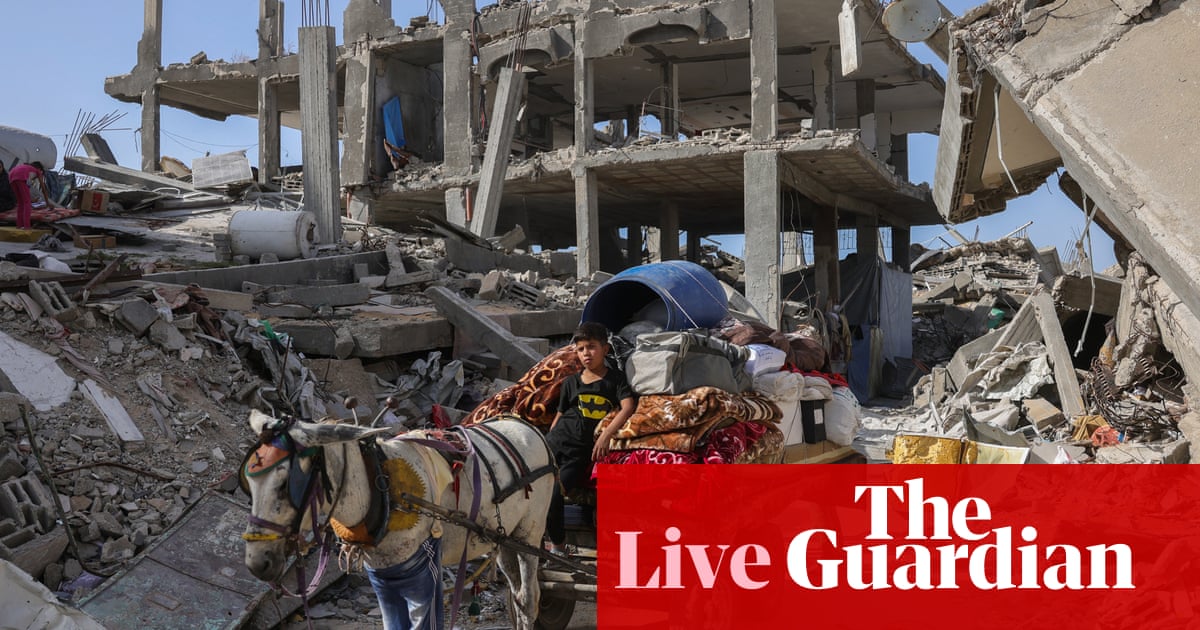Welcome to our continuing live coverage of the developments in the Middle East and Israel’s war on Gaza
The leaders of the UK, France and Canadaon Monday condemnedIsrael’s “egregious actions” in Gaza and warned of joint action if Israel did not stop its military offensive.
But Israel’s prime minister,Benjamin Netanyahu, hit back at British prime ministerKeir Starmer, French presidentEmmanuel Macronand Canadian prime ministerMark Carney, saying their joint statement was a “huge prize” for Hamas in the war.
Starmer, Macron and Carney criticised Israel’s blocking of aid and comments by ministers in Netanyahu’s government who have threatened the mass displacement of Palestinians.
“We will not stand by while the Netanyahu government pursues these egregious actions,” the leaders said. “If Israel does not cease the renewed military offensive and lift its restrictions on humanitarian aid, we will take further concrete actions in response.”
Netanyahu gave a furious response in a statement released by his office.
“By asking Israel to end a defensive war for our survival before Hamas terrorists on our border are destroyed and by demanding a Palestinian state, the leaders in London, Ottawa and Paris are offering a huge prize for the genocidal attack on Israel on October 7 while inviting more such atrocities,” he said, referring to the Hamas attacks in 2023 that set off the war.
Netanyahu said “all European leaders” should follow US presidentDonald Trump’s example in supporting Israel.
“The war can end tomorrow if the remaining hostages are released, Hamas lays down its arms, its murderous leaders are exiled andGazais demilitarised. No nation can be expected to accept anything less and Israel certainly won’t,” Netanyahu declared.
“This is a war of civilisation over barbarism. Israel will continue to defend itself by just means until total victory is achieved.”
The first few aid trucks entered Gaza on Monday after nearly three months of Israel’s blockade of food, medicine and other supplies,Israeland the UN said.Five trucks carrying baby food and other desperately needed aid entered the territory of more than 2 million Palestinians via theKerem Shalom crossing, according to the Israeli defence body in charge of coordinating aid to Gaza, Cogat.The UN humanitarian chief,Tom Fletcher, called it a “welcome development” but described the trucks as a “drop in the ocean of what is urgently needed”.
Food security experts last week warned of famine inGaza. During the latest ceasefire that Israel shattered in March with a wave of deadly airstrikes, about 600 aid trucks entered Gaza each day.Fletcher said an additional four UN trucks were cleared to enter Gaza. Those trucks may enter Tuesday, Cogat said. Fletcher added that given the chaotic situation on the ground, the UN expects the aid could be looted or stolen, a growing problem as resources became increasingly scarce.Benjamin Netanyahusaid his decision to resume “minimal” aid to Gaza came after allies said they couldn’t support Israel’s expansion of its assault if there were “images of hunger” coming from the Palestinian territory.
Welcome to our continuing live coverage of the developments in the Middle East and Israel’s war on Gaza
The leaders of the UK, France and Canadaon Monday condemnedIsrael’s “egregious actions” in Gaza and warned of joint action if Israel did not stop its military offensive.
But Israel’s prime minister,Benjamin Netanyahu, hit back at British prime ministerKeir Starmer, French presidentEmmanuel Macronand Canadian prime ministerMark Carney, saying their joint statement was a “huge prize” for Hamas in the war.
Starmer, Macron and Carney criticised Israel’s blocking of aid and comments by ministers in Netanyahu’s government who have threatened the mass displacement of Palestinians.
“We will not stand by while the Netanyahu government pursues these egregious actions,” the leaders said. “If Israel does not cease the renewed military offensive and lift its restrictions on humanitarian aid, we will take further concrete actions in response.”
Netanyahu gave a furious response in a statement released by his office.
“By asking Israel to end a defensive war for our survival before Hamas terrorists on our border are destroyed and by demanding a Palestinian state, the leaders in London, Ottawa and Paris are offering a huge prize for the genocidal attack on Israel on October 7 while inviting more such atrocities,” he said, referring to the Hamas attacks in 2023 that set off the war.
Netanyahu said “all European leaders” should follow US presidentDonald Trump’s example in supporting Israel.
“The war can end tomorrow if the remaining hostages are released, Hamas lays down its arms, its murderous leaders are exiled andGazais demilitarised. No nation can be expected to accept anything less and Israel certainly won’t,” Netanyahu declared.
“This is a war of civilisation over barbarism. Israel will continue to defend itself by just means until total victory is achieved.”
